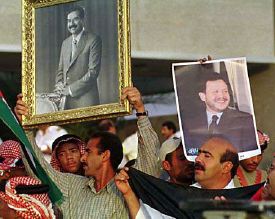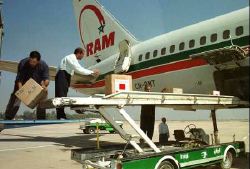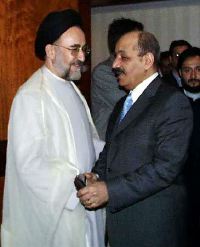 |
| Vol. 2 No. 9 | Table of Contents MEIB Main Page | 5 October 2000 |
 |
| Iraqis and Jordanians celebrate the arrival of a Royal Jordanian airliner at Baghdad's airport on September 27 |
The last month has witnessed a dramatic improvement in Baghdad's relations with other Middle Eastern governments, clearly evident in the rush by several Arab states to break the ten year-old air embargo on Iraq and indications that more of its neighbors will follow suit. Whether these developments will lead to the full-scale rehabilitation of Iraq is likely to depend upon the reaction of the United States.
Several factors have led to the recent wave of unprecedented overtures to Baghdad within the Arab world. The most immediate factor (or, rather, precondition) paving the way for the flights was the reopening of Baghdad's international airport on August 17. Second, and perhaps most critical, was the decision by France to permit a planeload of doctors, artists and other passengers to fly to Baghdad on September 22 without the approval of the UN sanctions committee, followed by a similar unapproved Russian flight. Since then, both members of the UN security council have more or less encouraged others to follow suit, insisting that merely notifying the security council of such flights (rather than obtaining its permission for them) is sufficient.
Third, Arab animosity toward Israel amid the apparent breakdown of the peace process has reawakened public support for any move seen as defying U.S. policy in the region.
Fourth, the rise in oil prices in recent months has tremendously bolstered Iraq's regional and international clout in two important respects. Baghdad's purchasing power, derived from its export of 2.6 million barrels of oil per day, has vastly increased, making it a much more attractive market for imports. Moreover, the rise in oil prices has essentially immunized Iraq from the threat of American military action. The conventional wisdom is that air strikes against Iraq would drive world oil prices to unacceptably high levels.
Fifth, there have been persistent rumors that Iraqi President Saddam Hussein is extremely ill and will soon pass the reins of power to his son Qusay. Once the face of Saddam is removed from the Iraqi regime, international consensus regarding the sanctions imposed during the 1990-91 Gulf crisis will dissolve. As American officials have stressed on numerous occasions, the U.S. is opposed first and foremost to Saddam as an individual, but not necessarily to the Iraqi regime he commands. In fact, the well-known preference of American officials for a so-called "silver bullet" transition in Iraq (whereby disgruntled senior military or civilian officials oust Saddam) suggests that a continuation of the Ba'athist regime in one form or another would be welcomed in Washington. To be sure, Qusay is not the successor they have in mind, but clearly a continuation of the sanctions will be more difficult to justify if and when he takes power. Once Qusay is at the helm and international sanctions have ended, the reasoning goes, those who took an early lead in befriending Iraq will be lavished with reconstruction contracts, preferential trade concessions, etc.
Jordan takes the lead . . .
Few were surprised that Jordan would be the first Arab country to send an aircraft to Baghdad. In July, a prominent London-based Arabic newspaper quoted King Abdullah of Jordan as saying that Jordan and Iraq had agreed to "turn a new page" in their relations,1 and the three-month old government of Prime Minister Ali Abu al-Ragheb (most of whose ministers are considered close to Iraq) has made no secret of its desire to improve trade relations with Baghdad.
Jordan's Ministry of Trade and Industry estimates that the Kingdom has lost about $800 million over the last decade as a result of the UN embargo. However, it is a well-known secret that a small number of prominent, well-placed Jordanian commercial elites have profited handsomely from selling pharmaceuticals, medical equipment, and other supplies to Iraq. Moreover, the Jordanian public has remained strongly pro-Iraqi over the years and an enormous boost in public support for the Abu al-Ragheb government was palpable immediately after the airliner departed for Iraq.
Jordan had been considering the idea of dispatching a plane to Iraq for quite some time, but apparently made the decision to do so shortly after Prime Minister Abu al-Ragheb met with Iraqi Vice-President Taha Yassin Ramadan. Indications that other Arab countries were contemplating similar moves led Abu al-Ragheb to convene a special cabinet meeting on September 26 to issue the decision.
While the Jordanian government clearly expects to derive considerable economic dividends from increased trade with Iraq, the extent of its reconciliation with Baghdad is likely to be determined first and foremost by the reaction from the U.S., which provides Jordan with $225 million in annual military and economic aid. Jordanian officials have been careful to portray the flight as an act of humanitarian concern rather than political solidarity with Iraq (a strategy mirrored later by other Arab states).
Abu al-Ragheb is widely expected to make an official visit to Baghdad in the next few months, making him the highest-ranking Jordanian official to visit Iraq since the 1990-91 Gulf crisis. Whether the visit actually takes place will be an important indication of Washington's power to halt normalization of ties between Jordan and Iraq.
. . . and others soon follow
 |
| Iraqi workers unload humanitarian aid sent from Morocco [AP/Jassim Mohammed] |
A Tunisair plane arrived in Iraq on October 4, carrying a team of surgeons and ophthalmologists, a cargo of medical supplies and Tunisia's national football team (which is scheduled to play an exhibition match with Iraq on October 6). Tunisian sources have indicated that a second flight, chartered by a lawyers syndicate and several political and professional groups, is scheduled for October 15. Tunisia, which currently occupies a seat on the UN Security Council, has recently questioned Kuwaiti reparations claims against Iraq in the UN. U.S. Defense Secretary William Cohen is scheduled to visit Tunis on October 7 to discuss the sanctions against Iraq. The U.S. has provided around $18 million worth of military equipment to Tunisia over the last two years.
The UAE, which has been among the most vocal proponents of an end to the sanctions, broke the ban on October 5 with the arrival in Baghdad of a flight carrying medical supplies and an official delegation headed by Health Minister Hamad Abderrahman al-Madfa. A UAE official said a day earlier that the flight was personally ordered by President Sheikh Zayed bin Sultan Al Nahayan to "lessen the suffering of the Iraqi people under sanctions and international isolation for the past 10 years." The UAE reestablished diplomatic relations with Iraq in April.
An Air Algeria plane carrying 10 tons of food, medical and educational supplies arrived in Baghdad on October 5. Among the 70 passenger on board were the president of the Algerian Red Crescent, Abdelkader Boukhrofa; a representative of the Algerian Committee of Support for the Iraqi People, Ahmed Baghdadi, and a former ambassador to Egypt, Mohamed Benmohamed.
Egyptian President Hosni Mubarak said on October 2 that he would permit nongovernmental groups to organize humanitarian flights to Iraq. A few days earlier, the coordinator of Egyptian Popular Delegation for Lifting the Sanctions on Iraq, Muhammad Sami, announced that the group was chartering an aircraft, "in protest against the sanctions," to carry a large delegation of intellectuals, artists, and politicians to Baghdad.2 Egypt, a key American ally in the Middle East, played a critical role in organizing Arab support for the U.S.-led coalition during the 1990-91 Gulf Crisis. In recent years, however, Mubarak has publicly called for an end to the sanctions.
Earlier this month, Syrian President Bashar Assad called for Arab states to strive for an end to sanctions against Iraq. Syrian officials have indicated that a flight carrying humanitarian aid will be sent in mid-October. Baghdad and Damascus broke diplomatic relations 20 years ago over the latter's support for Iran in the Iran-Iraq war, but since 1997 have been gradually normalizing relations. Earlier this year, the two states opened interests sections in each other's capitals and have held a series of trade-related negotiations, the latest during Syrian Minister of Industry Ahmad Al-Hamou's visit to Baghdad on September 24.
A Lebanese plane carrying medical supplies is expected to arrive in Baghdad during the second week of October. Lebanese Prime Minister Selim al-Hoss gave the go-ahead for the flight earlier this month.
Kuwait and Saudi Arabia Stand Alone
Although the Kuwaiti and Saudi governments did not officially condemn the flights, they have expressed opposition through private channels and by permitting the press to either criticize the flights or belittle their importance.
The Kuwaiti daily al-Watan quoted several members of the National Assembly as condemning the flights and even demanding retaliation against states responsible for them. MP Musallam al-Barrak denounced Jordan and Yemen after they sent planes to Baghdad and called upon the government to sever diplomatic relations with them. "The talk used to be of popular pro-Iraq activities in those countries, but now it is officials and ministers who are in the forefront of those rushing to defy the international community and shake hands with the leaders of the Iraqi regime," he said. "We must not be meek in our dealings with these countries . . . If there were another invasion of Kuwait, they would support it strongly because they are only interested in serving their own interests." Similarly, MP Nasser al-Sane said the actions were "deliberate violations of the embargo against the Iraqi regime" and MP Muhammad al-Khalifa called for "firm international action against those who violate the international will and help support the position of the Iraqi regime and exacerbate the tragedy of the Iraqi people."3
The Saudi-owned London daily Al-Sharq al-Awsat, which often expresses the views of the Saudi monarchy, portrayed the flights as symbolic gestures which will not erode international sanctions against Iraq. "The Security Council remains united behind its position on the need for Iraq to comply with its commitments to the international community," the paper wrote shortly after the Jordanian flight arrived in Baghdad.4 Interestingly, the Saudis blocked an attempt late last month by the United Arab Emirates to send a caravan of camels carrying one million pencils for Iraqi schoolchildren. The caravan was detained and impounded by as it attempted to pass overland through Saudi territory.
The other members of the Gulf Cooperation Council (GCC) are expected to eventually follow the lead of the UAE and other Arab states. Bahrain and Qatar have already restored diplomatic relations with Baghdad, while Oman (which never broke relations with Baghdad) called for lifting the sanctions at the UN last month.
 |
| Khatami and Ramadan in Caracas |
Iran and Turkey
Although Iran has not authorized any flights to Iraq thus far, its relations with Baghdad have improved considerably in recent months. Iranian President Mohammed Khatami met with Iraqi Vice President Taha Yassin Ramadan in Caracas, Venezuela after an OPEC summit on September 29, the highest-level meeting between representatives of the two former enemies in nine years. According to Iranian officials present at the talks, the two sides have accepted the 1975 Algiers agreement, a border and security pact that was abrogated by Iraq shortly before its invasion of Iran in 1980. Iraq had expressed interest in reviving the accord since 1991, but was rebuffed. Under the terms of the agreement, Iraq recognized Iranian sovereignty over the Shatt al-Arab waterway. The agreement also calls for non-interference by each side in the other's internal affairs, prohibits actions undermining each other's security and provides for cultural exchanges. "We discussed every bilateral affair,'' Mohammed Ali Abtahi, chief of staff for President Khatami, told reporters after the meeting. Asked about the armed opposition groups which each country sponsors to carry out cross border raids on the other, Abtahi expressed optimism that there will be "cooperation in the future'' on this issue.5
Turkey announced on October 4 that it would permit medical aid flights to Iraq and hinted that it may soon appoint an ambassador to Baghdad. Interestingly, the announcement followed a U.S. House of Representatives committee's recent approval of a resolution calling upon President Bill Clinton to officially designate the massacre of Armenians by the Ottoman Turkish state 85 years ago as a case of genocide.
Notes
1 Al-Quds Al-Arabi 19 July 2000. A stream of official protests from Amman began almost immediately after the report was published, but an official at the royal palace later conceded that the King had indeed spoken these words in an off-the-record "exchange of words" with the paper's editors (United Press International, 19 July 2000).
2 Al-Arabi (Cairo), 1 October 2000.
3 Al-Watan (Kuwait), 29 September 2000.
4 Al-Sharq al-Awsat (London), 29 September 2000.
5 Reuters, 29 September 2000.